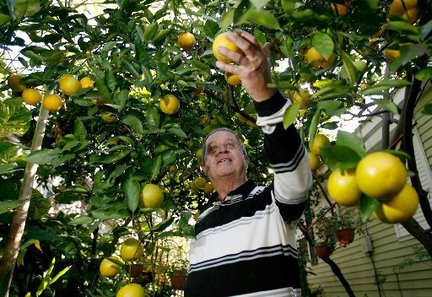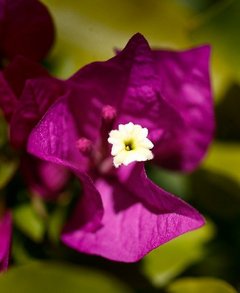http://www.nola.com/homegarden/index.ssf/2009/11/citrus_grove_sweetens_gardener.html
Citrus grove sweetens gardener's life
By R. Stephanie Bruno
November 28, 2009, 4:45AM
THE GARDEN: A sprawling citrus and tropical fruit garden surrounding a 1940s cottage in Jefferson Parish
THE GARDENER: Ron Rosato, a New Orleans native, veteran citrus grower and Catholic deacon whose mission work in Nicaragua introduced him to growing tropical fruit
WHY HE LOVES IT: My family always had gardens I think its just in my blood, Rosato says. Between my Sicilian ancestry and my German-Irish aunt who lived with us, I always had my hands in mud.
 JOHN MCCUSKER / THE TIMES-PICAYUNE Ron Rosato of Jefferson has
JOHN MCCUSKER / THE TIMES-PICAYUNE Ron Rosato of Jefferson has
gardened all his life. I started with citrus because its easy to grow and
does really well in our climate, he says.
BLANK SLATE: Ron Rosato doesn't remember a time when he didn't garden.
"Even when I was little, my aunt would have us work in the garden with her," he said. "I come from a family that has always grown food to eat. The idea was, if you cant eat it, dont plant it."
So when Rosato and his family moved to Hyman Drive off Jefferson Highway in 1967, there was no question that he would carry the tradition with him.
"I grow a lot of different things now, but I started with citrus because its easy to grow and does really well in our climate," he said. "I must have 12 or 14 different varieties."
As his interest in citrus grew, so did the square footage of yard space devoted to cultivating the plants. Now Rosato has transformed his driveway into a tunnel of grapefruit, blood oranges, and satsumas; his front yard into a forest of Louisiana sweet oranges and some accompanying tropicals; his rear yard into a navel orange, sweet kumquat, key lime, lemon and pomelo orchard; and a side alley into a potting area where new plants take root.
"I keep telling my kids Im going to have to get rid of the house so I can expand the garden," he said. "The truth is that I really do live outside in the garden more than in the house. You can find me there until 11 or 12 at night sometimes."
FAMILY AFFAIR: Rosato has three daughters and several grandchildren who grew up exposed to his passion for growing, so when he talks about demolishing part of his house to make room for more citrus trees, they know hes only half-joking.
"They grew up with it, and so they like it too," he said. "One of my daughters lives in Lakeview, and her whole garden was destroyed in the Katrina flood, so we spent a lot of time not too long ago replanting everything. That gives me two gardens to work in, so Im OK for now."
The family love of gardening has now transferred to the grandchildren, who find their own way to participate.
"The citrus trees all have a bumper crop this year, probably because we didnt have a hurricane, and a lot of the fruit is just too high up for me to reach even with my ladder," Rosato said. "So my grandkids climb the trees for me and get on the roof of my shed and toss it down. They all like to eat it, and one of them likes to play pitch and catch with big grapefruits."
The harvesting rituals have become so popular that Rosato said he and his family have planned a "Picking Picnic" for early December.
"Its just what it sounds like," he said. "Everyone one comes over, my grandkids and my nieces and nephews, and theyll harvest all the fruit while we have a picnic outside. Its my best crop in 42 years, and I need all of them to help."
What the family doesnt eat, give to friends, turn into juice or preserve, Rosato gives to Ozanam Inn, a homeless shelter, or sells at fundraising sales for the Catholic Center at Tulane, where he is a deacon.
"If God gave it to me, its my responsibility to give it back," he said.
He now also sells a few plants on the Internet.
"Sometimes, I get gigantic orders, and I have to tell people, Hey guys, Im not a big nursery. Its just me and my backyard," he said.
 Orange, yellow and green arent the only
Orange, yellow and green arent the only
colors gracing Ron Rosatos lush garden of
citrus and tropicals.
TROPICAL PARADISE: If living in southern Louisiana got Rosato interested in growing citrus, it was his Catholic mission work in Nicaragua that prompted his interest in tropicals.
"We started going down there in 1992, and I just couldnt believe the fruit that grows wild there. Mango, papaya, guava, zapote, passion fruit. When I came back, I went online and found the California Rare Fruit Growers Association and started reading up on growing tropicals," he said. "I buy seeds from them, and now I grow all sorts of varieties."
Rosatos collection of fruit-bearing plants also includes Celeste figs, pineapple, star fruit, blueberries and pomegranates.
"You dont have to spend $12 a bottle at the health food store for pomegranate juice," he said. "You can grow your own."
Like a parent who is hesitant to favor one child over another, Rosato has a difficult time saying what his favorite fruit is.
"But if I have to say, I guess its zapote," he said. "It tastes like brown sugar and root beer."
DOWN AND DIRTY: Although Rosato has never had any trouble getting plants to grow, he says there are hazards he has to guard against. Freezes pose the most obvious risk to his garden, so Rosato keeps most of his plants in pots and can salvage a few should a serious freeze threaten.
"My entire collection I have now is plants I started after the 1989 freeze wiped everything out," Rosato said. "A deep freeze is Armageddon for me."
Another threat is a bacterial disease spread by the Asian citrus psyllid, an aphid-like bug. The disease, huanglongbing or Citrus Greening, has devastated citrus crops in Florida and has been detected in five Louisiana parishes. According to Rosato, the LSU AgCenter monitors for the pest and has installed a trap near his home to check for the insect.
"If you catch it early enough, you can spray, but if it gets going, the only thing you can do is cut the tree down," he said.
BEST KEPT SECRET: Despite all of his success growing citrus and other fruit, Rosato says he really cant claim a lot of credit for how easily and lushly plants grow on his property. In fact, he says it has more to do with the soil than anything he does or doesnt do.
"This is the secret: This whole area used to be a race track 70 or 80 years ago," he said. "But then in 1949, Morris Hyman came in and built the Jefferson Park subdivision you can see it on a map from how the streets are laid out. So youve got to figure with that all those horses and all that horse manure, youre going to have really fertile soil."
R. Stephanie Bruno can be reached at
housewatcher@hotmail.com.





